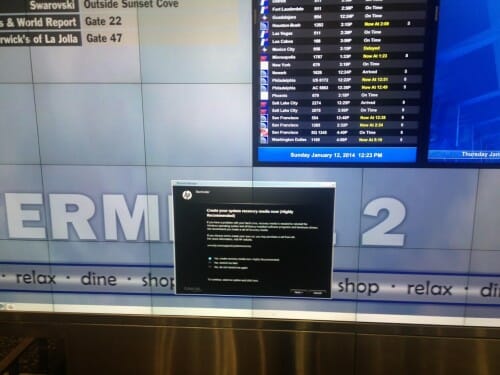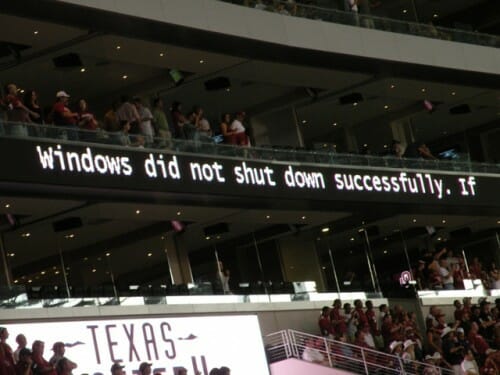Windows as a Stand-Alone Server
I have written before about how much trouble I had using windows as an unattended server for an application -- in this case for the XBMC video system on my TV's around the house. No matter what I did, how many tweaks I made, how many websites I checked for advice, within a day or two some application or popup would take control of the screen and send my unattended application to the background. This would not be such much of a problem if it was just me using it, but with a non-tech-savvy family members trying to interact with the device with a TV remote, it was unacceptable. Eventually I switched to the Linux version of XBMC in a distribution call Openelec and I have had zero problems since.
I was reminded of all this at the San Diego airport. They have these big beautiful screens with flight and weather and travel information. But apparently they have problems making the windows popups go away as well (that's some sort of HP registration message in the window):
The most amazing example I have ever seen was on a giant, giant advertising screen on the front of a casino in Las Vegas, which had a huge windows popup covering whatever ads were supposed to be served up. I wish I had my camera but I was out jogging at the time.
Update: A reader sent me this, via gizmodo, from Cowboys stadium


Well, there are two major editions of every windows release: the client (professional/home/enterprise/...) and the server version (usually called Windows #### Server).
They are separate for a reason (different styles of policies for the different use cases). I've never had issues with running Windows as a Server, but it's noteworthy that whoever is administering the computer pictured above has at some point in the past installed some HP software (printer drivers? auto updater?), which indicates that they didn't have much experience when they made that decision...
Ubuntu has a similar problem with Apport and the default updater. It's a pretty unavoidable side effect of running any user-focused OS in an integrated environment -- the two purposes don't overlap perfectly. That said, this particular example (and HP as a company) tends to be pretty bad about stupid popups.
The Server and Home Media versions of Windows are better about it, but they're also versions of the OS that are least likely to be used by folk for this purpose... so, that's a fun catch-22.
There are a lot of hassles hidden inside the Task Scheduler. I'd guess most of these popups are running from scheduled tasks. The vast majority of users don't know to look there.
Going by memory so this may be wrong :) ---> Right click "Computer" > manage > tasks.
Even if you opt out to the data sharing with MSFT there are a half dozen data collectors running occasionally. Some every day, others less frequently. There is even a task that runs every 90 days that checks to see if you have unlicensed software installed. For our own good right?
Some linux distros have similar automated tasks but those are easier to locate & remove.
There are a number of "kiosk" applications that can make this much easier. Also, there are WAYS to lock certain applications on top but generally those have to be baked in previous to deployment.
}}} (that's some sort of HP registration message in the window):
LOL, HP distributes their new systems with no CDs or anything. If you want a copy of Windows/Recovery disks, you get to burn one using the popup tool you are seeing there, using your own blank media. You only get to burn it once, apparently, you might make copies and distribute them, or something... :-S
BTW, I do not recommend the usage of HP for anything -- their UEFI system violates Microsoft's own stated guidelines for the proper behavior of UEFI and Windows 7/8, and will not allow Windows to boot up with older style MBR disks present.
This can actually expose the system to GREATER virus risks, since windows then goes on a hunt for a bootable OS, which can/will boot an infected OS partition when there was no intention to even boot the older MBR disk. Yeah, had that happen. Retarded ephwits.
:-/
No, as I note above, this is HP's default software for creating the restore disks -- It's possible it's not even running the windows server version of the OS, really, and just being used as one.
Mine pops up that message every once in a while (I've already gotten the recovery disks via another source, so, since it can only be done once, have rejected it when it asks, about once a month or two).
I'd bet you could go into the Control Panel|Administrative Tools|Services and figure out which service is running that does that, and shut it down. But they'd have to know to do that. And to figure out which one it is in the second place.
Actually, unless they changed it, it's pretty easy to defeat their security so you can make a backup copy of your restore disks. It only took me a few minutes of googling. (I don't have the laptop any more, so I don't remember what I did, but it wasn't hard to find the solution.)
I bought a pretty nice HP laptop a couple of years ago. After 8 months it started having CPU failures. They "repaired" it 3 times, taking about a month each time, thus robbing me of 1/4 of my warranty period. They eventually ran the clock out without actually fixing it, and it died permanently after only 18 months. I'm death on 'em now: I tell everyone I know not to get HPs because they can't or won't fix their product.
Having said that if you still have the laptop see my other comment about your restore disks.
This was a desktop, not a laptop.
I essentially had to take my old data disk and use a tool (Minitool Partition Wizard -- HIGHLY recommended -- much better than Acronis, even the free tool) to reformat the MBR disk to GPT.
Another option would be to get an external drive enclosure (Recommended: Rosewill -- turns any 3.5" drive into an external, portable drive**) will also solve the problem, since you can turn the drive off until after W7/8 is booted up.
** it will not have the shock resistance of many portable drives, acked, so more care is called for on some levels...
I am sure... but I figure why spend time doing it, when I already have a set and don't see any use for another... :-D
P.S., of some relevance -- it took me about 6 weeks of back and forth with these idiots at HP to ack there was a problem -- and to tell me to eph off, they didn't care.
I'm halfway tempted to contact an ambulance chasing attorney to see if I can find one that wants to initiate a class-action suit against HP just for the nuisance value. I'm more incensed by their "eph you" attitude, as well as the fact that they've switched to an entire new system (UEFI+GPT, vs. BIOS+MBR) without teaching anything at all to not only their first level techs, but the supervisors of the same. I had to get past the supervisors to their "L2" support, which was like pulling teeth -- hint: They don't CALL it 'L2 support', so, when you say "You can't help me, clearly, connect me to your L2 support", they just say "we don't have any L2 support". This is obvious bovine excreta, but they'll hold to the line even as they keep talking about BIOS as though UEFI were no different than a BIOS update. It serves the same function, but it's not the same thing. Any more than ATA is the same as SCSI, because they both are used to access disk drives.
Crap support. How the hell does an organization figure to continue existing with crap support in an IP & Services Economy...?
If you are OK with one set obviously there's no need. I wanted a second set in case something happened to the first one. I don't think Dell cares if you have a second set of backup disks.
A coworker just got a new Dell last week, and it has EUFI. I'll have to see if it has the same problem, but I'll bet it doesn't.
I really wish HP would go back to the way they were when they still valued their customers after the ale. 10 years ago I had an HP desktop that had a boot failure problem, and they cross-shipped me a replacement. I really like the aesthetics of their machines, whereas Dells are fairly ugly, but I won't buy another HP after the way they shafted me on my laptop.
The last I looked, the software that prompts you to create backup discs is an app that appears in the Program and Features control panel and can be simply uninstalled if it has served its purpose.
The cable TV provider in Arcadia, CA used to have an info channel with a scrolling text feed. This was originally done with an Atari 800, which had several qualities that made it well suited to the task. Later, they replaced that with an Amiga, which in many ways was descended from the Atari with one of the primary engineers working on both chip sets. As with common in those days, the Amiga was prone to crashing during the wee hours when nobody was paying attention at the cable head end. So, if you tuned to the info channel at 3 AM on any random night, you had a good chance of seeing a 'Guru Meditation' error message.